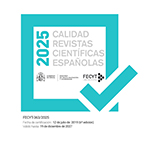La historiografía feminista y los estudios de las ciencias Nuevos marcos metodológicos
Resumen
: La incorporación masiva de las mujeres a la universidad y el avance del movimiento feminista fueron determinantes en la introducción de los estudios de las mujeres y la crítica feministas en la Academia en la segunda mitad del XX. Su influencia en la función de desvelar el androcentrismo como ideología subyacente en la producción del saber se hizo sentir en todas las disciplinas académicas, aunque con distintos tiempos y ritmos. En el caso de las ciencias de la naturaleza el retraso fue mayor debido fundamentalmente a lo intocable de los atributos de la ciencia: su objetividad y su neutralidad. Entre los proyectos innovadores que surgen en ese marco, se señalan ejemplos contemporáneos que interpelan a la historia de la ciencia tradicional y hacen significativas las biografías de mujeres. Esto es, la historiografía feminista en su intersección con los estudios de las ciencias ha permitido incorporar nuevos marcos metodológicos, que facilitan la recuperación de la agencia de las mujeres y su historia, ocultas en la historia tradicional, así como investigar las causas de esa ocultación y sus consecuencias en la conceptualización del saber y en la creación y organización de sus instituciones. Son proyectos que muestran que el conocimiento del mundo natural es una actividad humana, resultado del trabajo de mujeres y hombres, al tiempo que amplían el horizonte de la producción científica. Asimismo, ayudan a comprender que no es cierto que las mujeres tengan en la actualidad las mismas oportunidades ni gocen de la misma libertad ni que se les reconozca la misma autoridad científica que a los hombres, como lo muestra el caso de la científica Barbara McClintock, aquí brevemente reseñado.
Descargas
Descarga artículo
Licencia
La revista Investigaciones Feministas, para fomentar el intercambio global del conocimiento, facilita el acceso sin restricciones a sus contenidos desde el momento de su publicación en la presente edición electrónica, y por eso es una revista de acceso abierto. Los originales publicados en esta revista son propiedad de la Universidad Complutense de Madrid y es obligatorio citar su procedencia en cualquier reproducción total o parcial. Todos los contenidos se distribuyen bajo una licencia de uso y distribución Creative Commons Reconocimiento 4.0 (CC BY 4.0). Esta circunstancia ha de hacerse constar expresamente de esta forma cuando sea necesario. Puede consultar la versión informativa y el texto legal de la licencia.











